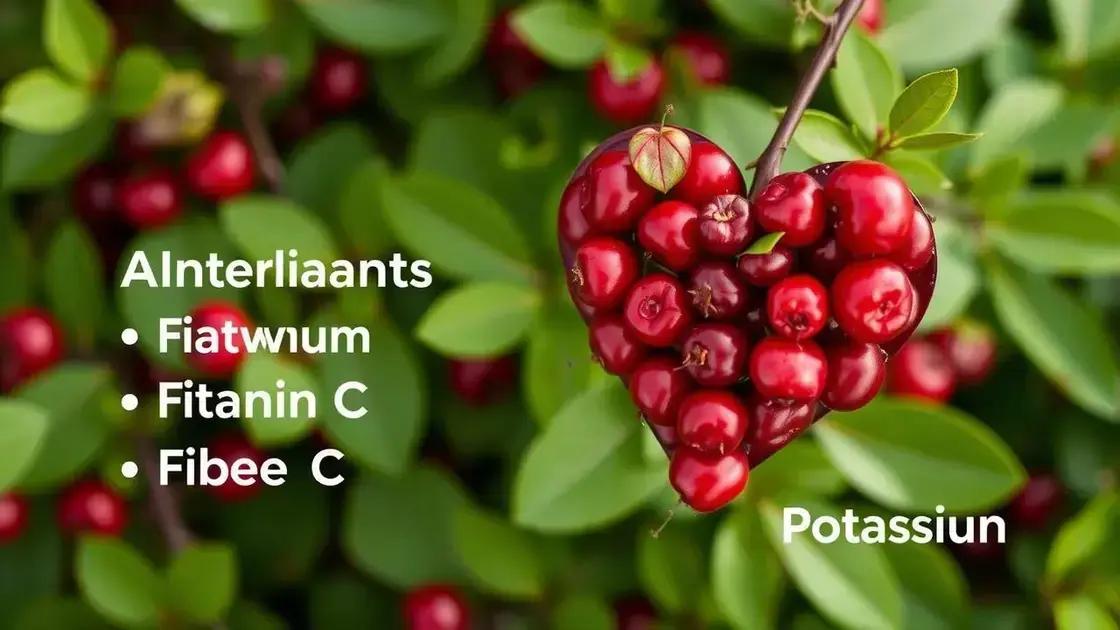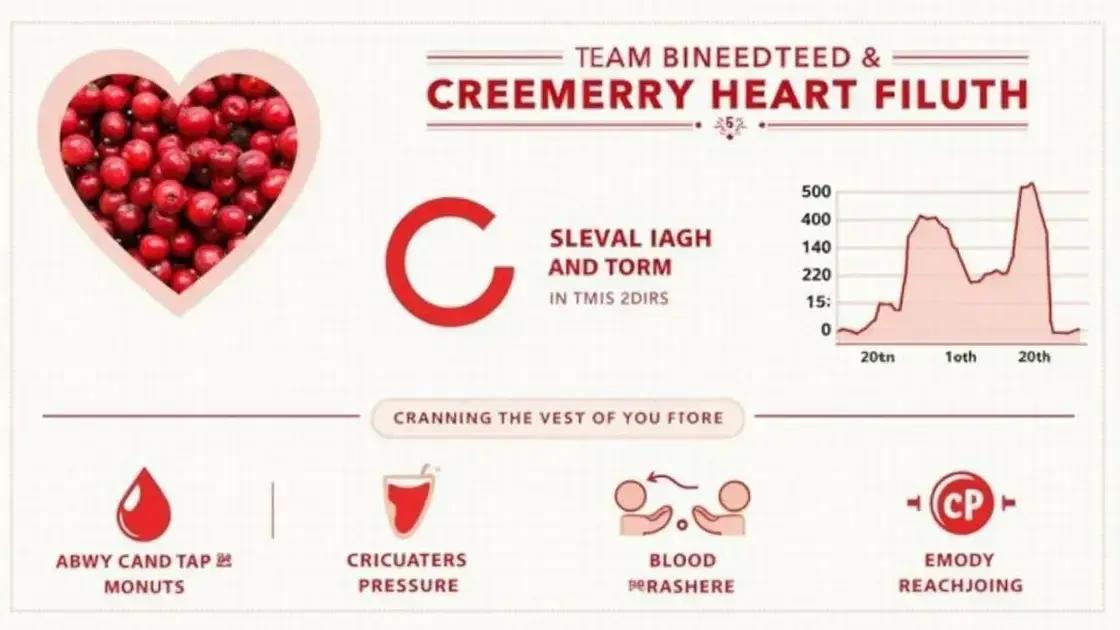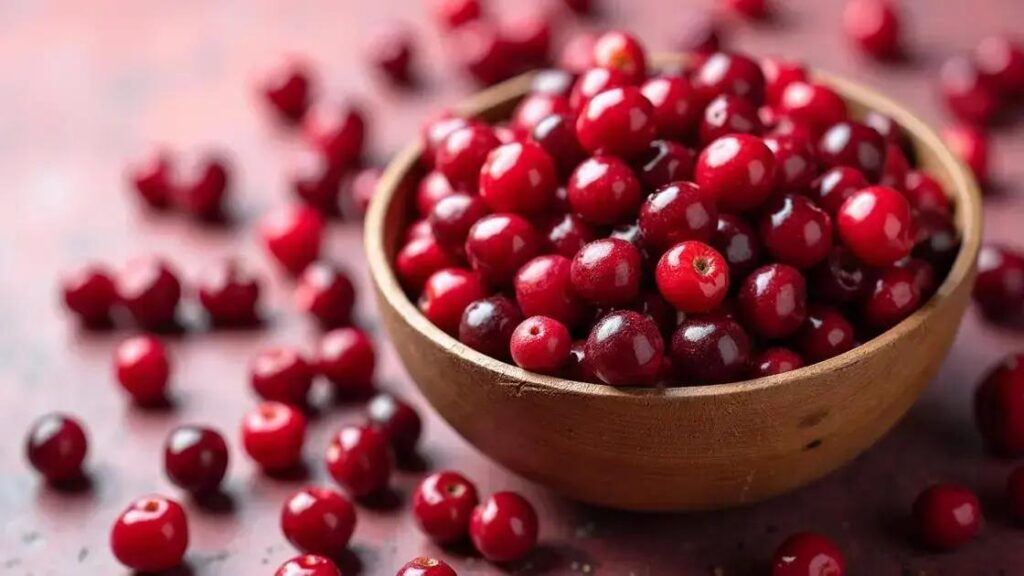Cranberries are beneficial for cardiovascular health due to their rich content of antioxidants, vitamins, and dietary fiber, which help lower cholesterol, reduce inflammation, and support healthy blood pressure, making them an excellent addition to a heart-healthy diet.
Cranberries are more than just a popular autumn fruit; they hold significant benefits for cardiovascular health. With their rich profile of antioxidants and vitamins, cranberries can provide essential support for a healthy heart. This article delves into the connection between cranberries and cardiovascular health, offering insights on the nutrients that contribute to heart wellness and how you can easily integrate them into your diet.
Understanding Cardiovascular Health

Understanding cardiovascular health is vital for maintaining a healthy lifestyle. The heart and blood vessels make up the cardiovascular system, which is responsible for pumping blood throughout the body. Blood carries essential nutrients and oxygen to organs and removes waste. A well-functioning cardiovascular system is key to overall health.
Importance of Heart Health
Heart health is crucial because it impacts other vital functions. Problems in the cardiovascular system can lead to serious conditions such as heart disease, high blood pressure, and strokes. Maintaining a healthy heart helps prevent these life-threatening issues, enhancing quality of life.
Factors Affecting Cardiovascular Health
Several factors influence cardiovascular health, including diet, exercise, genetics, and lifestyle choices. A balanced diet rich in fruits and vegetables, regular physical activity, and avoiding smoking are critical in maintaining heart health. Understanding these factors can help everyone make informed choices to improve their cardiovascular well-being.
Symptoms of Cardiovascular Issues
People should be aware of symptoms indicating possible cardiovascular problems. Common signs include chest pain, shortness of breath, fatigue, and irregular heartbeat. Recognizing these symptoms early on can lead to timely medical attention and better health outcomes.
Regular Check-ups and Monitoring
Regular check-ups with a healthcare provider are essential for monitoring heart health. Blood pressure, cholesterol levels, and other vital metrics should be regularly assessed to detect any potential issues. Early detection can significantly improve treatment outcomes and overall heart health.
Overall, understanding cardiovascular health lays the foundation for making healthier choices and reducing the risk of heart-related diseases. With the right knowledge and preventive measures, everyone can work towards a healthier heart and a longer life.
Nutrients in Cranberries that Promote Heart Wellness

Cranberries are packed with nutrients that contribute to heart wellness. They are rich in antioxidants, vitamins, and minerals that work together to support cardiovascular health. Understanding these nutrients can help highlight the benefits of including cranberries in your diet.
Antioxidants
One of the most important components of cranberries is their high antioxidant content. Flavonoids and phenolic acids are powerful antioxidants found in cranberries. They help to reduce inflammation and protect blood vessels from damage caused by free radicals.
Vitamin C
Cranberries are an excellent source of vitamin C. This vitamin is not only essential for a healthy immune system but also plays a crucial role in maintaining blood vessel integrity. Vitamin C contributes to the production of collagen, which helps strengthen blood vessel walls.
Fiber
Another significant nutrient in cranberries is dietary fiber. Fiber helps lower cholesterol levels and promotes heart health by improving circulation. Consuming fiber regularly can also aid in weight management, which is essential for reducing the risk of cardiovascular diseases.
Proanthocyanidins
Cranberries contain a unique type of antioxidant called proanthocyanidins. These compounds help prevent bacteria from adhering to the lining of blood vessels, promoting better blood flow and reducing the risk of developing blood clots.
Potassium
Cranberries also provide potassium, a mineral that helps regulate blood pressure. Maintaining healthy blood pressure levels is vital for overall heart health. By including cranberries in your diet, you can contribute to a balanced intake of this essential mineral.
Incorporating cranberries into your meals can significantly benefit your heart. The combination of these nutrients makes cranberries a powerful ally in promoting cardiovascular wellness.
Research Studies on Cranberries and Heart Health

Research has shown that cranberries may play a meaningful role in promoting heart health. Numerous studies have explored how these nutrient-rich berries affect cardiovascular wellness and their potential benefits.
Clinical Trials
Several clinical trials indicate that cranberry consumption can improve cardiovascular measures. In one study, participants who incorporated cranberry juice into their diet experienced a notable decrease in blood pressure. This suggests that cranberries may be beneficial for maintaining healthy blood pressure levels.
Cholesterol Levels
Another area of research highlights the impact of cranberries on cholesterol levels. A study published in The American Journal of Clinical Nutrition pointed out that daily cranberry juice intake was linked to lower levels of LDL cholesterol, commonly known as “bad” cholesterol. This reduction plays a significant role in decreasing the risk of heart disease.
Inflammation and Antioxidant Effects
Cranberries are rich in antioxidants, which help reduce inflammation—an important factor associated with cardiovascular diseases. Research studies demonstrate that the antioxidant properties of cranberries can support overall heart health by preventing oxidative stress and promoting blood circulation.
Effects on Blood Vessel Function
Studies also focus on how cranberries affect blood vessel function. One trial found that cranberry supplements significantly improved endothelial function. Healthy endothelial function contributes to optimal blood flow and reduces the risk of clots and related cardiovascular issues.
Meta-Analyses
Meta-analyses synthesizing various research findings confirm the heart health benefits of cranberries. These comprehensive reviews suggest that including cranberries in the diet can lead to improved lipid profiles and better overall cardiovascular outcomes.
Continued research into cranberries and heart health sheds light on the potential of this fruit to support cardiovascular wellness. Incorporating cranberries into a balanced diet may offer significant benefits for heart health.
Incorporating Cranberries into Your Diet

Incorporating cranberries into your diet is easy and enjoyable! There are many ways to add these healthy berries to your meals and snacks.
Breakfast Options
Start your day with a nutrient-packed breakfast. Add fresh or dried cranberries to your oatmeal or yogurt. They add sweetness and a nice tart flavor. You can also blend cranberries into a smoothie with other fruits for a refreshing drink.
Snacks
Cranberries make a perfect snack. Try dried cranberries on their own, or mix them with nuts and seeds for a satisfying trail mix. This combination not only tastes great but also provides healthy fats and fiber for fullness.
Salads
Boost your salads with cranberries. Add whole cranberries or dried cranberries to your favorite salad. They pair well with greens, nuts, and cheese, bringing a delightful burst of flavor and beneficial nutrients.
Baking
When baking, consider using cranberries. You can mix dried cranberries into muffins, cakes, or bread. This not only adds a unique taste but also enhances the nutritional profile of your baked goods.
Sauces and Salsas
Cranberries can be a great ingredient in sauces and salsas. Make a cranberry sauce to serve with chicken or pork. You can also mix crushed cranberries into a fresh salsa for a zesty twist with a touch of sweetness.
Cooking with Cranberry Juice
Incorporate cranberry juice into your meals by using it as a base for marinades or salad dressings. Try mixing cranberry juice with vinegar and olive oil for a tasty vinaigrette.
With these simple ideas, adding cranberries to your diet can be fun and delicious. Enjoy the many health benefits they offer while enhancing your meals!
Conclusion: Benefits of Cranberries for Heart Health

Cranberries offer various benefits for heart health, making them a valuable addition to your diet. Their nutrient profile is packed with elements that help support cardiovascular wellness.
Rich in Antioxidants
Cranberries are high in antioxidants, which protect the heart by combating oxidative stress. These antioxidants help reduce inflammation in blood vessels, promoting better circulation.
Lowering Cholesterol Levels
Regular consumption of cranberries has been linked to lower levels of LDL cholesterol and improved overall cholesterol profiles. This can significantly reduce the risk of heart disease.
Improving Blood Pressure
Cranberries may also assist in maintaining healthy blood pressure levels. Their properties help relax blood vessels, contributing to better heart function.
Enhancing Blood Vessel Health
The compounds found in cranberries support the endothelial function of blood vessels, which is crucial for maintaining healthy blood flow and preventing blood clots.
Easy to Incorporate
Moreover, cranberries are easy to include in your meals. Whether fresh, dried, or as juice, they offer a delicious way to boost your heart health without much effort.
With all these benefits, cranberries can play an essential role in a heart-healthy diet. They not only improve cardiovascular health but also enhance overall well-being.
In Conclusion: Embrace the Power of Cranberries for Heart Health
Cranberries are a fantastic addition to any diet, especially for those looking to improve their cardiovascular health. Packed with antioxidants, fiber, and vital nutrients, they offer numerous benefits that promote heart wellness.
Research supports the idea that cranberries can help lower cholesterol levels, manage blood pressure, and enhance blood vessel function, all contributing to a healthier heart. Their versatility in meals makes it easy to incorporate them into your daily routine.
By making a conscious effort to include cranberries in your diet, you can take significant steps toward better heart health and overall well-being. Don’t miss out on the heart-healthy advantages that cranberries provide!
FAQ – Frequently Asked Questions about Cranberries and Heart Health
How do cranberries benefit heart health?
Cranberries are rich in antioxidants and nutrients that help lower cholesterol, manage blood pressure, and improve blood vessel function.
What nutrients are found in cranberries that promote cardiovascular wellness?
Cranberries contain antioxidants, vitamin C, dietary fiber, proanthocyanidins, and potassium, all of which contribute to better heart health.
Can I incorporate cranberries into my daily meals?
Yes, you can easily add cranberries to breakfast, snacks, salads, baked goods, and even sauces to enhance your diet.
What research supports the health benefits of cranberries?
Numerous studies have shown that cranberries can improve cholesterol levels, reduce inflammation, and enhance blood pressure regulation.
Are there any side effects of consuming cranberries?
While cranberries are generally safe, excessive consumption may lead to digestive issues or interactions with certain medications. It’s best to consume them in moderation.
How can I include more cranberries in my diet?
You can try adding fresh or dried cranberries to smoothies, oatmeal, salads, and baked goods, or enjoy cranberry juice as a beverage.













